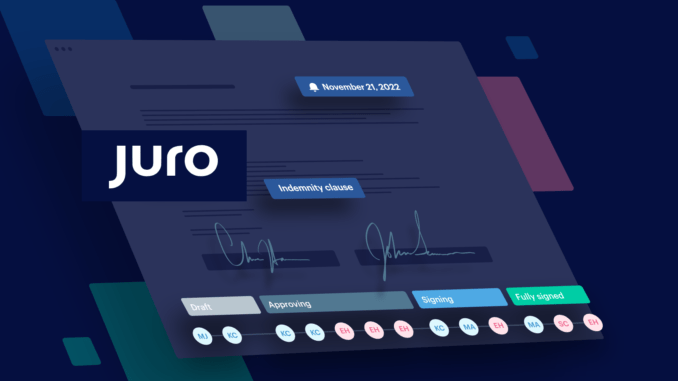
London-based contracting platform Juro has won two US-based digital first companies, DataDog and Envoy, as new clients, in line with its ambitions to expand its customer base in North America.
DataDog is in the business of monitoring cloud-scale applications, while Envoy is a digital platform that deals with visitor management and logistics.
The contract management pioneer has a track record for working with digital first companies, such as Deliveroo, Nested, and Skyscanner, to name a few.
On why the fast-growing companies chose to work with Juro, CEO and co-founder, Richard Mabey, told Artificial Lawyer: ‘I think the kind of businesses we have started working with in the US have chosen to work with us because of our unique approach, and because they are generally on the bleeding edge of innovation, [and] so want to completely remodel the way in which contracts are agreed and managed.’
‘One of the big differentiators for Juro as a business is the way in which contracts are built within the system using data models, and this creates highly modular, dynamic agreements.
‘That’s been a major driver for clients to say: ‘Well, we are no longer willing to process contracts as files, Word documents and PDFs, and then have to go and pay contract review or contract analytics providers later to unpick them down the line,’ he explained.
Mabey’s thinking is in tune with a growing number of contract experts who see the fundamental problem with contracting as one to do with managing unstructured data from day one, with the idea that if you can start the contracting process with some form of highly structured framework, where data can be captured easily and stored from the moment the contract is signed, then a lot of the later review tasks are no longer necessary.
Of course, that still leaves the billions of contracts in the world that have not been made in this way. And it will take a very long time before every contract can be highly structured to deliver all the needed data that lawyers later on may wish to review. So, legal AI doc review using NLP is going to be with us for many, many years to come.
Perhaps what we may see is a twin-track approach evolving, with highly structured contracts with ‘at signature data extraction’ for some types of agreements, and others of a more bespoke and complex nature remaining in the unstructured format.
‘What we are saying is that if you can make all of your contracts structured from the get-go, and treat them as data rather than files, then you actually can get much more value and insight,’ Mabey added.
The news comes after Juro launched a contract reader capability, which it said would improve efficiency for inhouse legal teams.
Regarding other developments, Juro said the recent release of its modern contract handbook had been a success. The project involved the participation of legal tech influencers, specifically those with an interest in contracts and contract automation, such as Peter Hunn from Clause, and Ken Adams the legal drafting expert.
—
By Irene Madongo